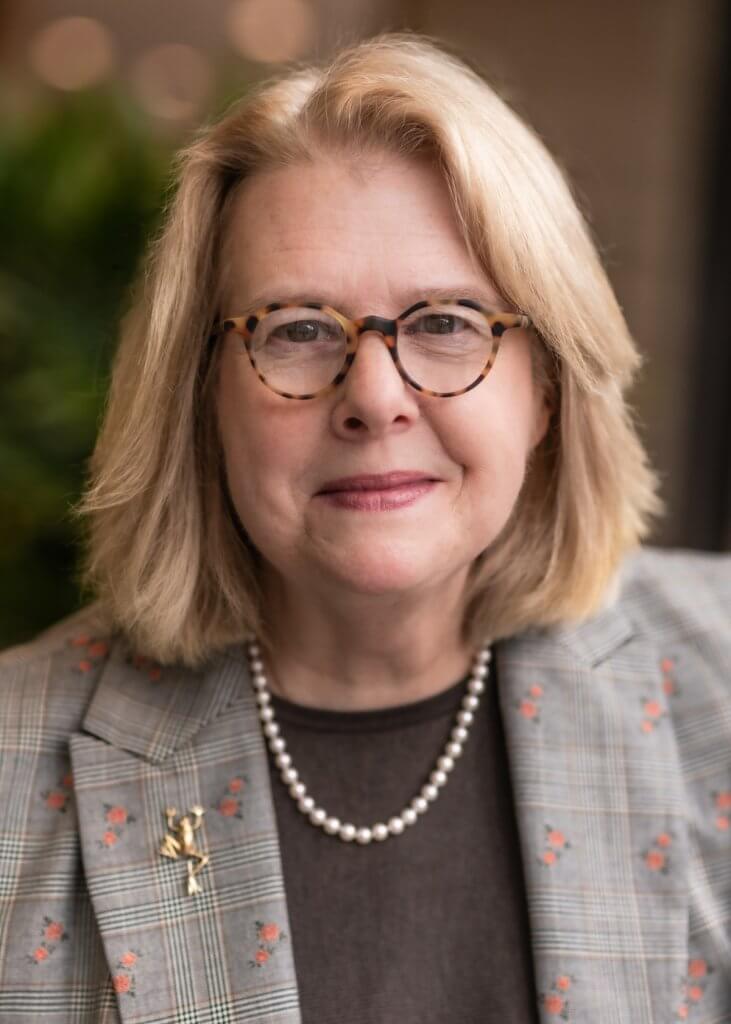Stephanie Davis is a master adapter. When she was initially diagnosed with serous uterine cancer, she found a way to continue working around surgery, radiation, and chemotherapy. Today, she is still adapting — moving from one treatment plan to another as her cancer changes — and is in consultation with her care team to keep it at bay.
Rather than focus on the fact that she has a hard-to-treat form of this cancer, Davis, 68, is thankful for her close access to the Susan F. Smith Center for Women’s Cancers at Dana-Farber and the latest clinical trials in its Gynecologic Oncology Program. To her, even the COVID-19 pandemic is simply one more obstacle to overcome: She is fine with the safety protocols in place, as long as she can still get to her regular infusions.
“Life is about dealing with what comes your way,” says Davis, who stays connected with her husband, John, over the phone during her visits to Dana-Farber. “The important thing is to have a good team helping you.”

Teamwork and transition
Everything started for Davis in May 2017. She was feeling overly fatigued; her primary care physician could not determine the cause, but when Davis began experiencing post-menopausal vaginal bleeding — an early sign of cancer in some women — her gynecologist ordered more tests that led to her diagnosis.
Her initial treatment included a hysterectomy, radiation, chemotherapy, and brachytherapy. Davis responded well, and the tumor growth was controlled, so she returned to her job as an elementary school teacher.
Then, in late 2018, Davis learned the cancer was growing again — and had spread to her stomach. Standard treatments were no longer an option; she needed to go on a clinical trial. It was determined that the best fit for Davis was a trial of the drug adavosertib which was enrolling patients at Dana-Farber.
The trial is based on research showing that uterine serous cancer cells are prone to replication stress — a glitch in their ability to duplicate DNA correctly. WEE1 is a protein that enables cells to tolerate replication stress; drugs like adavosertib that inhibit WEE1 worsen replication stress in the cancer cells, leading to DNA damage and cell death.
At Dana-Farber, Davis came under the care of oncologist Ursula Matulonis, MD, chief of the Division of Gynecologic Oncology; nurse practitioner Catherine Earley, NP; and clinical research nurse Stephanie Morrissey, BSN, RN. Davis credits this trio for always being available to sooth concerns and answer questions, and they in turn praise her positive outlook and flexibility.
“As soon as I met my new team, I knew I was in good hands,” says Davis. “The transition to Dana-Farber was so easy, because the staff is so open to working with other people. They put the patients first, they are always available, and they know how to calm you if problems arise.”

Ready for anything
Davis spent a year on the adavosertib (or AZD1775) trial, a combination of daily oral treatments at home and infusions each three weeks in the Susan F. Smith Center. Initially she had a 70 percent reduction in her tumor progression, but eventually the cancer began growing again. When the time came that a change in treatment was indicated, Davis was eager to enroll in another clinical trial.
Luckily, she qualified for a study using the drugs mirvetuximab and pembrolizumab (Keytruda) that targets a different genetic expression than adavosertib. She started on this combination in August 2020, and stayed on it until early 2021. She is currently on another multidrug regimen of pembrolizumab and the oral drug lenvatinib.
“Stephanie has participated in trials that are quite unique, such as the first time a WEE1 inhibitor has been used to treat uterine serous cancers,” says Matulonis. “The last trial she was on combined an antibody drug conjugate and an immune checkpoint inhibitor focused specifically to this cancer.”
If and when the time comes, Davis says she will be ready for yet another trial. She feels a close connection with Morrissey and her other caregivers, as well as a deep commitment to the clinical trial process. And when she had to retire from teaching due to the demands of the clinical trials, her care team was right there for support.
“Stephanie and the team helped me through,” says Davis. “If I can help other people by being on a trial, and hopefully myself too, I want to do so.”
Morrissey believes that Davis’ outlook is a big factor in her strong response to treatment.
“She has an incredible attitude, and faces challenges head on,” says Morrissey. “While each trial has its own schedule, structure, and requirements, Stephanie is always open to them.”
In addition to her care team, Davis has her husband John and their adult son, John III, who moved back in with his parents to assist with his mom’s care.
“Sometimes adversity brings opportunity,” John Davis says. “Stephanie deals better with opportunity than anybody.”

Stephanie is the best. She has always stayed positive and pushes on. I think that is a big help in her recovery. I love you Stephanie and hope we can go out to lunch with the group sometime soon.
I’m fighting uterine cancer at the moment with a second round of chemo.
It wasn’t contain after a full hysterectomy.